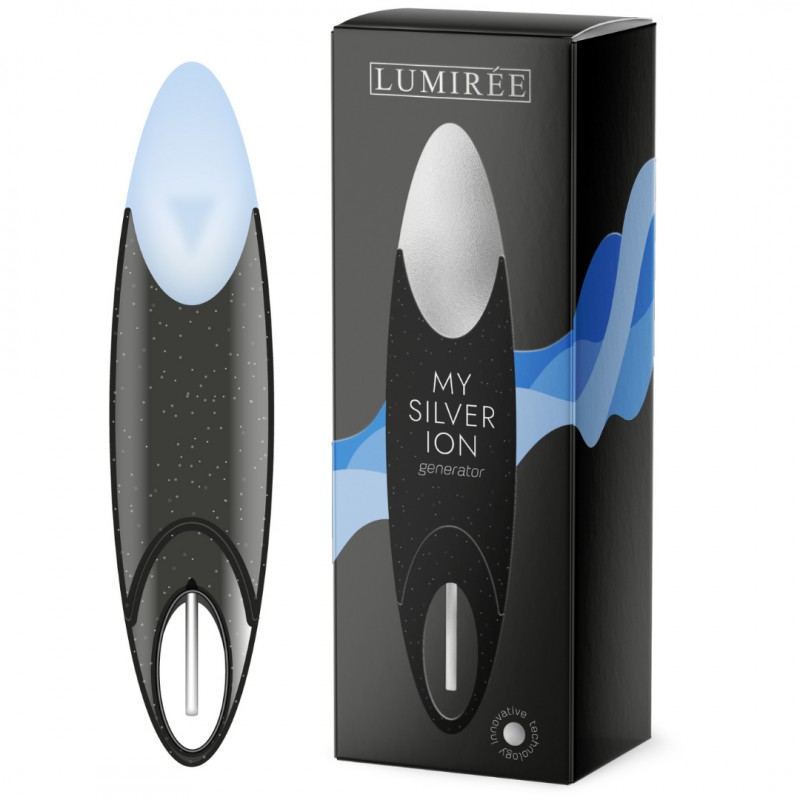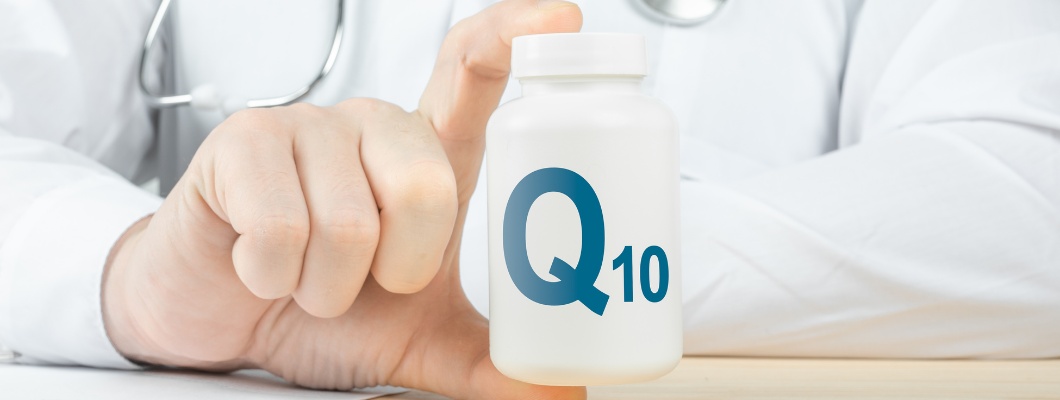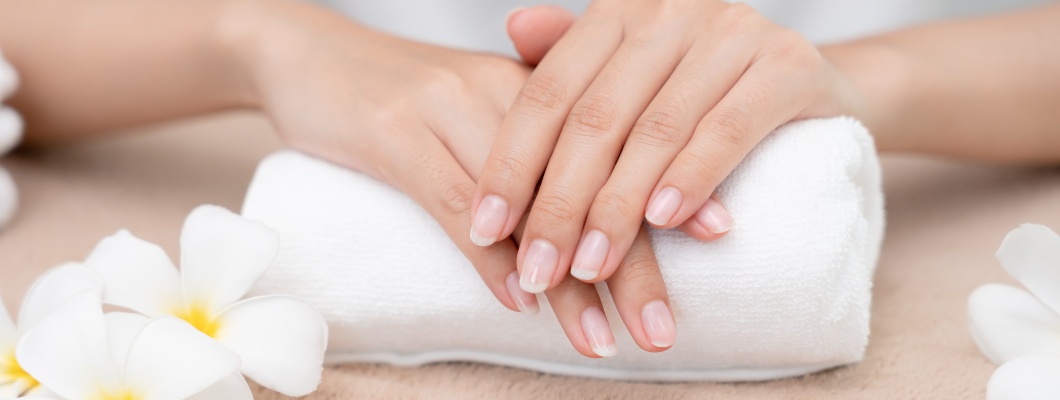What are the Benefits of Colloidal Silver?

Colloidal silver, also known as silver water, is a topic that is attracting more and more attention these days. Although it is not a new discovery, its use and benefits are often a matter of discussion and controversy.
In this article, we'll take a look at what colloidal silver is, how it's produced, what its potential benefits and risks are, and what experts say about it.
Table of Contents
1. What is colloidal silver?
Colloidal silver, also known as silver water, is a liquid that contains microscopic particles of silver. These particles are so small that they are usually less than 100 nanometers in size, making them invisible to the human eye and allowing the silver water to remain transparent.
The colloidal state of silver particles means that they are evenly distributed in the liquid without settling to the bottom, thanks to electrostatic forces that prevent them from agglomerating ( clumping ). The amount of silver in silver water is measured in parts per million ( ppm ), which determines the concentration of silver ions in solution.
The main idea behind the creation of colloidal silver is to use the antimicrobial properties of silver, which have been known since antiquity. Silver has the ability to destroy various types of microorganisms such as bacteria, viruses and fungi. This is due to the ability of silver ions to interact with vital enzymes and components of microbial cells.
Production
The production of colloidal silver involves the use of electrolysis, in which an electric current is applied to silver electrodes immersed in water. This results in the release of silver ions. The quality of the silver water depends on the purity of the silver and water used, as well as the control of the electrolysis process.
History and traditional uses of colloidal silver
Historically, silver was used in medicine long before the development of modern antibiotics. In the early 20th century, before the advent of penicillin, silver compounds were widely used to treat infections and disinfect medical instruments.
This practice declined with the discovery of more effective and cheaper antibiotics.
Ancient Greece and Rome
In ancient Greece and Rome, silver was used to store water and other liquids to prevent the growth of bacteria and fungi. People at that time stored water in silver containers to keep it fresh for a longer period. Silver coins were placed in containers of milk to slow the spoiling process. These practices demonstrate the early understanding of silver's antimicrobial properties.
Middle Ages
During the Middle Ages, silver continued to be used in medicine. Wealthy families had silverware and utensils, believing it would protect them from disease. Silver nitrate was used to treat ulcers and wounds. Doctors at the time applied silver dressings to wounds to speed healing and prevent infections.
Modern applications
Nowadays, silver is finding new applications in various fields. Colloidal silver is popular in alternative medicine.
Silver nanoparticles are widely used in modern industry. They are added to a variety of products including clothing, food and cosmetics because of their antimicrobial properties. Silver nanoparticles are used in medical devices such as catheters and implants to reduce the risk of infections.
2. What are the benefits of colloidal silver?

1. The benefits of colloidal silver for the immune system
Colloidal silver has powerful properties that support and strengthen the immune system. Silver ions are effective against over 650 different pathogens including bacteria, viruses and fungi. This makes silver water a valuable tool in the fight against infection and diseases.
Antibacterial properties
Silver ions bind to the cell walls of bacteria, disrupting their functions and leading to cell death. This process is effective against a wide range of bacterial strains, including those that are resistant to antibiotics.
Antiviral properties
Colloidal silver is also effective against viruses. Silver ions interact with virus particles by disrupting their capsid ( protein shell ), which prevents viruses from attaching and penetrating human cells.
Antifungal properties
Fungal infections can be difficult to treat, but colloidal silver shows promising results. Silver ions penetrate the cell membrane of fungi, disrupting their structure and function. This leads to effective destruction of the fungal cells.
Strengthening the body's natural defense mechanisms
Colloidal silver stimulates the production of white blood cells, which are the body's main line of defense against infections. This boosts the immune response and helps the body fight pathogens. Increasing the number and activity of white blood cells improves overall immune function.
Antioxidant properties
Colloidal silver also has antioxidant properties that protect cells from damage caused by free radicals. Antioxidants reduce oxidative stress, which is important for maintaining a healthy immune system.
Reduction of the inflammatory processes
Inflammation is the immune system's natural response to infection and injury, but chronic inflammation can lead to a variety of health problems. Colloidal silver helps regulate the inflammatory processes, maintaining a healthy balance in the body.
2. The benefits of colloidal silver for the skin
Colloidal silver is well known for its many skin benefits. It is a powerful tool for keeping skin healthy thanks to its antiseptic, anti-inflammatory and regenerative properties.
Let's take a closer look at how silver water can support skin health:
Treatment of acne
Colloidal silver helps reduce the bacteria that cause acne by killing germs and preventing new infections from developing. Its anti-inflammatory properties reduce the redness and swelling associated with acne. Regular use of silver water can significantly improve the condition of the skin.
Healing of wounds
Silver ions help regenerate skin cells and stimulate the growth of new tissue. Silver water also reduces the risk of infections by destroying pathogens that can get into the wound.
Treatment of eczema and dermatitis
Colloidal silver is useful in treating various skin conditions such as eczema and dermatitis. It reduces inflammation and soothes irritated skin. Silver water helps to relieve itching and redness while helping to restore the skin. Regular use of colloidal silver can significantly improve the condition of skin with chronic dermatological problems.
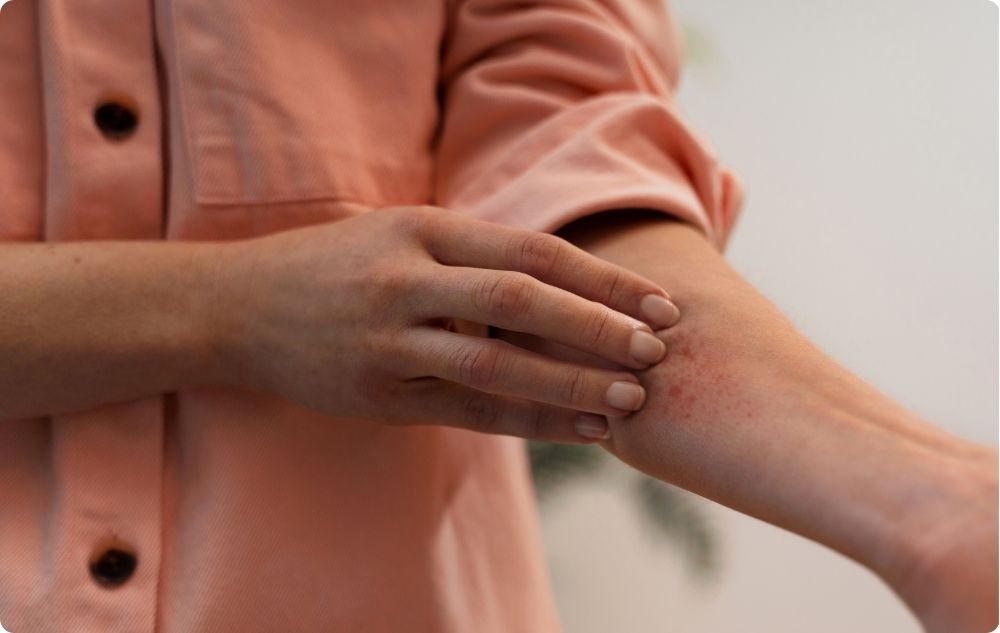
Moisturizing and nourishing the skin
Colloidal silver helps hydrate the skin. It helps retain moisture in the skin, keeping it soft and supple. Silver water also helps balance skin oils, making it suitable for all skin types, including sensitive skin.
Antioxidant properties
Colloidal silver has antioxidant properties that protect the skin from damage caused by free radicals and oxidative stress. This helps preserve the youthfulness and elasticity of the skin, preventing premature aging and the appearance of wrinkles.
3. The benefits of colloidal silver for the digestive system
Colloidal silver has significant benefits for the digestive system, helping to maintain a healthy microbiome and prevent infections. It can be helpful for a variety of gastrointestinal issues and support overall digestive health.
Balancing the intestinal microflora
Colloidal silver helps maintain the balance of the intestinal microflora. It destroys pathogenic bacteria that can cause infections and imbalances.
Prevention of gastrointestinal infections
Colloidal silver is effective against a variety of pathogenic microorganisms, including bacteria and viruses that can cause gastrointestinal infections. It destroys these microorganisms before they can cause diseases such as food poisoning and gastroenteritis.
Improved digestion
Colloidal silver aids the digestive process by improving the functioning of the stomach and intestines. It helps in the breakdown of food and absorption of nutrients. This is especially important for people with gastrointestinal disorders such as irritable bowel syndrome ( IBS ) and chronic gastritis.
Relief of inflammation
Silver water has anti-inflammatory properties that can help reduce inflammation in the gastrointestinal tract.
Disinfection of water and food
Silver water can be used to disinfect drinking water and food by removing harmful bacteria and viruses. This is especially important in situations where the quality of water and food is questionable. Using colloidal silver for disinfection reduces the risk of gastrointestinal infections and improves overall health.
4. The benefits of colloidal silver for the respiratory system
Colds and the flu
Colloidal silver is effective in fighting viruses that cause colds and the flu. It destroys virus particles before they can spread and cause serious infection. Gargling with colloidal silver or using it as a nasal spray can reduce cold and flu symptoms and speed up the recovery process.

Sinusitis relief
Sinusitis is an inflammation of the sinuses that can be caused by bacteria, viruses or allergies. Colloidal silver can help reduce inflammation and destroy the infectious agents causing sinusitis. Using silver water as a nasal spray can relieve nasal congestion and improve breathing.
Treatment of bronchitis
Bronchitis is inflammation of the bronchi, which can be acute or chronic. Colloidal silver can help treat bronchitis through its anti-inflammatory and antimicrobial properties. It destroys bacteria and viruses in the airways and reduces inflammation, relieving symptoms such as coughing and difficulty breathing.
Asthma relief
Asthma is a chronic disease that causes inflammation and narrowing of the airways. Colloidal silver can help reduce inflammation and relieve asthma symptoms. Although silver water cannot replace standard asthma treatment, it can be a helpful adjunct for keeping airways clear and healthy.
Prevention and treatment of pneumonia
Pneumonia is a serious infection of the lungs that can be caused by bacteria, viruses or fungi. Silver water can be used as a complementary treatment for pneumonia due to its antimicrobial properties.
Improving general respiratory health
Colloidal silver can also be used for general respiratory health improvement. It keeps the respiratory tract clear of pathogens and reduces the risk of infections. Regular use of silver water can help maintain a healthy respiratory system and improve quality of life.
5. The benefits of colloidal silver for oral hygiene
Colloidal silver has significant benefits for maintaining oral hygiene by helping to prevent infections, cavities and bad breath. Its antiseptic and antibacterial properties make it an effective means of maintaining oral health.
Fighting bacteria in the oral cavity
Colloidal silver is effective against bacteria that cause various oral problems, including cavities and gingivitis. The antibacterial properties of silver water help destroy pathogens that accumulate in the mouth, especially after eating. This reduces the risk of developing cavities and gum infections.
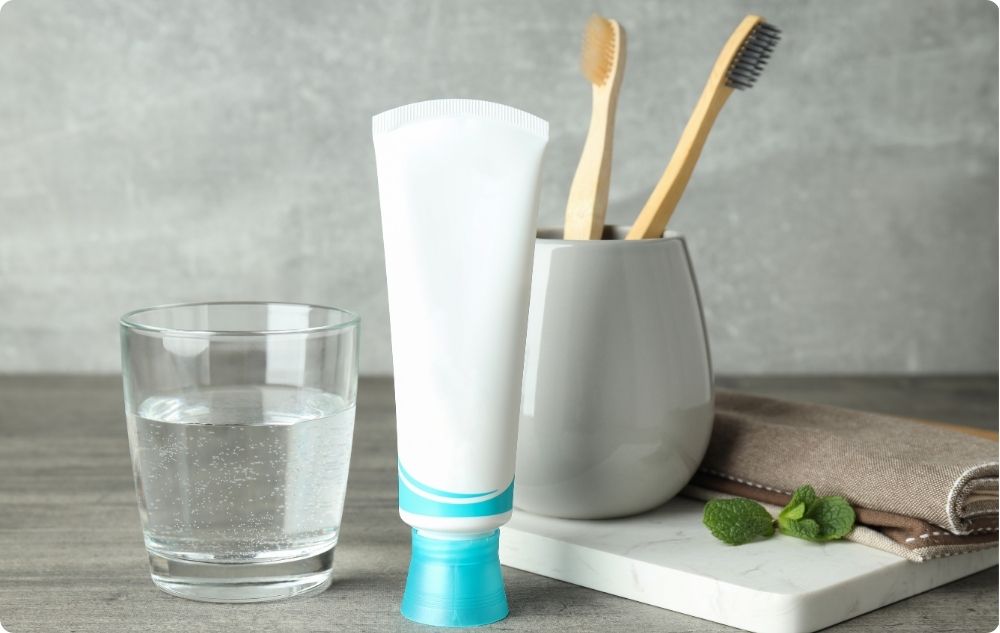
Prevention of cavities
Cavities are the result of a build-up of bacteria and plaque on the teeth, which produce acids that break down enamel. Rinsing your mouth with colloidal silver after brushing your teeth can help destroy the bacteria, preventing plaque and cavities from forming. Silver water not only kills bacteria, but also helps heal tooth enamel.
Relief of gingivitis and periodontal disease
Gingivitis and periodontal disease are inflammatory gum diseases that can lead to tooth loss if left untreated. Colloidal silver can help reduce inflammation and destroy the bacteria causing these conditions. Rinsing the mouth with silver water can improve gum health and reduce bleeding and swelling.
Fighting bad breath
Bad breath ( halitosis ) is often caused by bacteria in the oral cavity that produce smelly compounds. Colloidal silver can help remove these bacteria and freshen the breath. Regular mouth rinsing with silver water can keep the mouth fresh and clean throughout the day.
Accelerating the healing of oral wounds
Colloidal silver can accelerate the healing of mouth sores, such as aphthae and cuts from dental appliances. It has antiseptic and regenerative properties that help prevent infections and promote the repair of damaged tissues. Applying silver water to mouth wounds can reduce pain and speed up the healing process.
6. The benefits of colloidal silver for home hygiene

Disinfection of surfaces
Colloidal silver is a powerful disinfectant that can be used to clean a variety of surfaces in the home. It is effective against bacteria, viruses and fungi, making it ideal for kitchen countertops, bathrooms, door handles and other frequently touched surfaces. Silver water kills pathogens, preventing the spread of infection and keeping the home clean and safe.
Air disinfection
Colloidal silver can be used in humidifiers and air purifiers to improve indoor air quality. It destroys airborne pathogens, reducing the risk of respiratory infections and allergies.
Cleaning toys
Children's toys are often a source of germs that can cause illness. Silver water is an effective way to disinfect toys without using harsh chemicals.
Washing and refreshing of textiles
Colloidal silver can be added to laundry to disinfect clothes, sheets and towels. It kills bacteria and prevents unpleasant odors, leaving textiles clean and fresh.
Deodorization and disinfection of refrigerators
Refrigerators can trap unpleasant odors and bacteria from a variety of foods. Colloidal silver can be used to clean and deodorize the inside of the refrigerator. It destroys the bacteria that cause odors and keeps the refrigerator fresh and clean.
7. The benefits of colloidal silver for pets
Colloidal silver offers many benefits not only for humans, but for our pets as well. Thanks to its antimicrobial and anti-inflammatory properties, it can help maintain animal health and hygiene.
Treatment of skin infections and wounds
Colloidal silver is effective for treating skin infections and wounds in animals. It can be applied directly to the injured areas where it destroys pathogens and speeds up the healing process. Silver water is particularly useful for wounds, bites and scratches, reducing the risk of infection and aiding tissue regeneration.
Relief of ear infections
Ear infections are a common problem in dogs and cats. Colloidal silver can be used to clean the ears and treat ear infections. It kills the bacteria and fungi that cause the infections, and relieves inflammation and itching.
Improving oral hygiene
Like humans, animals can also suffer from dental problems and bad breath. Colloidal silver can be used to rinse pets’ mouths, reducing bacteria and preventing plaque and gingivitis. This helps maintain healthy teeth and gums and freshen their breath.

Improving digestion
Colloidal silver can be added to water or animal feed to improve digestion and prevent gastrointestinal infections. It kills pathogenic bacteria in the gastrointestinal tract, which helps maintain a healthy gut microflora. This is particularly useful in animals that are susceptible to gastric disorders.
Strengthening the immune system
Colloidal silver helps strengthen the immune system of animals by stimulating the production of white blood cells and increasing their activity. This makes animals more resistant to infection and disease. Silver water can be useful for animals that are often in stressful situations or have weakened immune systems.
8. The benefits of colloidal silver for plants
Colloidal silver has significant benefits for maintaining plant health. It can aid growth, prevent disease and improve the general condition of plants.
Prevention of fungal infections
Fungal infections are a common problem in plants and can lead to serious damage and loss. Colloidal silver is effective in combating various types of fungi. It destroys fungal spores and prevents the spread of infections. Spraying plants with silver water can help maintain healthy leaves and stems.

Stimulating growth
Colloidal silver can stimulate plant growth. It improves nutrient and water uptake, aiding root system development. Silver water also stimulates chlorophyll production, which improves photosynthesis and plant growth.
Improving resistance to disease
Colloidal silver increases the resistance of plants to various diseases and pests. It strengthens the immune system of plants, making them more resistant to infections and insect attacks.
Maintaining the freshness of cut flowers
Colloidal silver can be used to maintain the freshness of cut flowers. Adding a little silver water to the vase extends the life of the flowers by preventing bacteria from growing in the water. This keeps the flowers fresh and beautiful for longer.
Water purification for irrigation
Colloidal silver can be used to purify irrigation water, removing pathogens and improving water quality. This is particularly useful in areas with low quality water or when using rainwater.
3. How to make colloidal silver yourself?
The production of colloidal silver at home requires a careful approach and proper equipment to ensure the quality and safety of the final product. It is important to use clean materials and strictly follow the production process.
Here are the steps and equipment you will need to make silver water at home:
Required equipment and materials
- Colloidal silver generator: The main appliance for silver water production is the colloidal silver generator. This device uses electric current to dissolve the silver particles in the water;
- Silver electrodes: Use high purity electrodes (99.99% silver);
- Power supply unit: The power supply unit provides a stable and constant current;
- Conductors: To connect the electrodes to the power supply unit;
- Electrode stand: Keeps electrodes stable in water.
Distilled water
Distilled water is necessary because it does not contain minerals and other impurities that can interact with silver and reduce the effectiveness of colloidal silver water.
TDS Meter ( Total Dissolved Solids Meter )
The TDS meter measures the concentration of dissolved silver particles in the water. This is important for controlling the quality of the final product.
How to make colloidal silver yourself - step by step guide
1. Preparing the electrodes
- Cleaning: Make sure the silver electrodes are clean and free of dirt. You can clean them with distilled water and a soft cloth;
- Placement the electrodes in the stand: Place the electrodes in the stand so that they are stable and do not touch each other.
2. Producing colloidal silver
- Use distilled water: Fill a clean glass container with distilled water. Avoid plastic containers as they can release chemicals into the solution;
- Immerse the electrodes: Immerse the electrodes in the water, making sure they are correctly positioned and stable.
- Connecting the power supply unit: Connect the colloidal silver generator to the power supply unit and switch on the appliance;
- Duration: Allow the generator to run for a set amount of time depending on the desired concentration. The process usually takes between 10-30 minutes and several hours;
- Check the concentration: Use the TDS meter to check the concentration of silver particles in the water. Typically, the goal is to achieve a concentration of about 5 to 20 ppm ( parts per million ).
3. Finishing and storage
- Switching off the appliance: After reaching the desired concentration, turn off the generator and carefully remove the electrodes;
- Filtration ( optional ): If there are visible particles or sediment, filter the solution using a coffee filter or other suitable filter;
- Storage: Store silver water in dark glass bottles in a cool, dark place to preserve its effectiveness.
Portable colloidal silver generators
With the advancement of technology, portable colloidal silver generators are now available in the market which make the process much more convenient and easy for users.
Advantages of portable generators:
Ease of use
The portable colloidal silver generators are designed to be easy to use even by people without technical experience. They usually come with instructions for use that explain the process step by step.
Speed and efficiency
These devices can produce silver water in a much shorter time compared to traditional methods. Some models can generate silver water in as little as 10-15 minutes.
Compact and travel ready
The portable units are compact and easy to carry, making them ideal for use at home, in the office or even while traveling. They often run on batteries or USB power, making them even easier to use.
Control of silver particle concentration
Many of these instruments have built-in automatic silver particle concentration control features, eliminating the need for manual measurement and minimizing the risk of errors.
Safety recommendations
- Avoid excessive concentration: Excessive concentration of silver particles can be toxic. Always monitor the concentration and follow the recommendations;
- Consultation with a medical professional: Consult a doctor or other qualified professional before using colloidal silver;
- Use quality materials and appliances: Use only high quality materials and generators to produce silver water.
The production of colloidal silver at home requires careful observation of the process and the use of appropriate equipment. Silver water can be useful for a variety of applications, but safety and quality should always come first.
4. How to take colloidal silver?
Drinking colloidal silver requires care and precision to reap maximum benefits without causing side effects.
Recommended dosage
The recommended dosage of colloidal silver depends on a variety of factors, including the concentration of silver in the solution, the purpose of use, and the user's individual characteristics such as age, weight, and health.
Here we will look at the main factors to consider when determining the correct dosage:

Concentration of silver ions
Colloidal silver is available in various concentrations measured in parts per million ( ppm ). The most common concentrations range between 10 ppm and 50 ppm. It is important to understand that a higher concentration does not always mean better results.
Individual characteristics
The individual characteristics of the user should be taken into account when determining the dose. People of lower weight or with specific health problems may need a lower dose. Pregnant and breastfeeding women should also be particularly careful and consult a doctor before use.
Dosage for adults
For adults, a dosage of 1 to 2 tablespoons daily, divided into two intakes - in the morning and evening is usually recommended. This amount is sufficient to achieve the desired antimicrobial effects without accumulating excess silver in the body. At higher concentrations of silver in the solution, the dose may be reduced.
Dosage for children
The dose for children should be significantly lower to prevent unwanted side effects. Usually about 1 teaspoon daily is recommended, depending on the age and weight of the child. It is important to consult a pediatrician before giving colloidal silver to your children to make sure it is safe for them.
Special cases
In some cases, such as acute infections or to speed up recovery after surgery, a temporary increase in dose may be necessary. This should only be done under the supervision of a healthcare professional who can assess the need for and safety of the higher dose.
The importance of correct dosage
Adhering to the recommended dosage is essential for the safety and effectiveness of colloidal silver. Excessive use can lead to a build-up of silver in the body and the development of conditions such as argyria. Proper dosage provides maximum benefits without a high risk of side effects.
How to take colloidal silver?
Taking colloidal silver requires precision and care to ensure maximum effectiveness and safety.
In this section, we will review best practices for silver water intake, including appropriate intake times, consumption frequency, and considerations for optimal absorption.
Methods of intake
- Oral intake: The most common method is oral intake. The measured amount of silver water is drunk directly or dissolved in water or juice;
- Gargling: For infections in the oral cavity or throat, colloidal silver can be used for gargling. Gargle with 1-2 teaspoons of silver water for about 30 seconds, then spit it out;
- Nasal administration: For sinusitis or other nasal cavity infections, colloidal silver can be used in the form of a nasal spray or drops. Spray a few times or drop a few drops into each nostril;
- Inhalation: For respiratory problems, silver water can be used for inhalations using a nebulizer. Add the recommended amount to the nebulizer and inhale the steam for 10-15 minutes;
- Local application: For skin infections or wounds, colloidal silver can be applied directly to the affected area using a cotton swab or spray.
Best time to take colloidal silver
The best time to take colloidal silver is in the morning and evening. Taking it in the morning on an empty stomach ensures rapid absorption of silver ions into the bloodstream, which increases their effectiveness. Evening ingestion before bed helps maintain the body's silver level overnight as the body recovers and regenerates.
Appropriate method of intake
Silver water can be taken directly from a spoon or diluted with a small amount of plain water. Some people prefer to hold it in the mouth for about 30 seconds before swallowing. This technique can help to better absorb the silver ions through the lining of the mouth.
Eating and colloidal silver intake
For optimal results, colloidal silver should be taken on an empty stomach. This means that you should not eat for at least 30 minutes before and after taking the silver water. This prevents interaction with food and other beverages that can reduce the effectiveness of the silver ions.

Intake frequency
The frequency of colloidal silver intake is a key factor in ensuring its effectiveness and safety. Understanding the appropriate frequency can help achieve optimal results for a variety of health conditions and goals.
Daily intake
Colloidal silver is usually taken twice a day - in the morning and in the evening. This frequency of intake allows for the maintenance of a constant level of silver ions in the body, which is important for long-term protection against pathogens and for supporting the immune system. Splitting the dose into two intakes also helps for better absorption and reduces the risk of overloading the body.
Intake in people with acute conditions
In cases of acute infections or health problems, it may be necessary to temporarily increase the frequency of colloidal silver intake. In such conditions, taking it three or four times a day for a short period of time may be recommended. This should be done under the supervision of a healthcare professional who can assess the need for and safety of more frequent intake.
Preventive use
For preventive purposes, colloidal silver can be taken once a day, especially during seasons with an increased risk of infection, such as flu seasons or when traveling in areas with poor sanitation. Preventive use helps strengthen the immune system and reduce the likelihood of developing infections.
Recommended duration of intake
The duration of intake of colloidal silver should be limited, usually between 7 and 10 days. After this period, it is advisable to take a break of at least one week. This allows the body to cleanse itself of accumulated silver and reduces the risk of unwanted side effects such as argyria.
Precautions for use
Consult a doctor
Always consult a doctor before starting to use colloidal silver, especially if you have chronic diseases or are taking other medications.

Keep an eye out for side effects
Be alert for signs of side effects, such as skin discoloration, stomach upset, or allergic reactions. If such symptoms occur, stop use and consult a doctor.
Avoid excessive use
Follow the recommended dosages and do not exceed the recommended duration of use to avoid the risk of silver accumulation in the body.
How to store colloidal silver?
Avoiding contact with metals
When storing and using colloidal silver, it is important to avoid contact with metal objects other than the silver particles themselves. Metal utensils or caps can cause a reaction with the silver ions and reduce their effectiveness. It is therefore recommended to use plastic or glassware when pouring and using colloidal silver.
Storage containers
Colloidal silver should be stored in dark glass bottles. Glass is inert and does not react with silver ions, thus preserving their properties. Dark bottles protect the solution from exposure to light, which can cause degradation of the silver particles. Plastic containers are not recommended as they may interact with the silver ions and reduce their effectiveness.

Temperature and storage location
Colloidal silver should be stored in a cool, dark place. The ideal storage temperature is between 5°C and 25°C. Avoid places with direct sunlight and high temperatures as heat and light can accelerate the breakdown of silver ions. Refrigerators are a suitable place for storage, but freezing of the solution should be avoided as this may alter the structure of the silver particles.
Storage duration
Colloidal silver has a long shelf life if stored properly. It can usually be stored for several months to a year. However, to ensure maximum effectiveness, it is recommended to use it within six months of opening the bottle. Regularly check the condition of the solution for changes in color or sediment, which may indicate a loss of quality.
5. Is colloidal silver safe? Risks and side effects
The safety of colloidal silver is of great importance, especially when it comes to prolonged or improper use. Although silver water has potential benefits, there are also significant risks and side effects to consider.
Risks and side effects
Argyria
One of the most serious and visible side effects of colloidal silver use is argyria. Argyria is a condition in which the skin and mucous membranes take on a bluish-gray color due to an accumulation of silver particles in the tissues. This condition is irreversible and can have significant social and psychological consequences.
Toxicity
Taking large amounts of silver can be toxic to the body. Silver particles can accumulate in the kidneys, liver and other organs, which can cause damage. Animal studies have shown that high levels of silver can cause toxic effects on the kidneys and liver.
Interactions with medications
Colloidal silver can interact with certain medications and alter their effectiveness. For example, silver can reduce the absorption of certain antibiotics and other medications, which can compromise their medicinal value. People who are taking medications for chronic illnesses should be especially careful and consult a doctor before starting to use silver water.
Allergic reactions
Although rare, there is a possibility of allergic reactions to silver. Symptoms can include skin rashes, itching and in severe cases, anaphylaxis. Anyone who develops an allergic reaction after using silver water should stop use immediately and seek medical attention.
Gastrointestinal problems
Taking colloidal silver can cause gastrointestinal problems such as nausea, vomiting and diarrhea. These symptoms can result from irritation of the stomach lining by silver particles.
Use during pregnancy
Due to the lack of sufficient scientific research on the effects of colloidal silver on pregnant women and the fetus, experts recommend that pregnant women avoid its use. The potential risks to the fetus have not been well studied, and the safety of silver water consumption during pregnancy cannot be guaranteed. Some studies have shown that metal ions, including silver ions, can penetrate the placenta and reach the fetus, which can lead to toxic effects.
Use when breastfeeding

Similar to pregnancy, breastfeeding women should be careful with the use of colloidal silver. There is insufficient data on whether silver particles can pass into breast milk and affect the baby. It is therefore advisable to consult a doctor before use.
Use for pets
Colloidal silver is also used to treat pets, but here too there are significant risks. Veterinarians may recommend silver water to treat wounds or infections in animals, but it is important to follow exact dosages and instructions. Overuse of colloidal silver in pets can lead to the same side effects as in humans - argyria, kidney and liver toxicity, and allergic reactions.
While colloidal silver may have potential benefits, the risks and side effects should not be overlooked. It is important to consult a health care professional and use colloidal silver deliberately and with caution.
6. Expert opinions on colloidal silver and its use
Experts' opinions on colloidal silver are varied and often contradictory. While some medical and health experts support its use for specific applications, others warn of its risks and highlight the lack of sufficient scientific evidence of its effectiveness and safety.
Some physicians and naturopaths support the use of colloidal silver, especially for external application and disinfection. They point to the long history of silver's use as an antimicrobial agent and base this on studies that demonstrate its antimicrobial properties.
Proponents of alternative medicine
Proponents of alternative medicine often recommend colloidal silver to treat a variety of health problems, including skin infections, wounds, and inflammatory conditions. They claim that silver water can help strengthen the immune system and treat chronic infections.
Medical communities and regulatory agencies
Regulatory agencies
Different regulatory agencies around the world have different positions on the use of colloidal silver. In the US, for example, the Food and Drug Administration ( FDA ) does not approve colloidal silver as safe or effective for any medical use. According to the FDA, products with colloidal silver should not be advertised with claims to cure diseases.
Recommendations from health organizations
Other health organizations also maintain a cautious approach to the use of colloidal silver. The World Health Organization ( WHO ) warns that there is insufficient scientific evidence of the effectiveness and safety of silver water for treating illness. They recommend always consulting a doctor before starting the use of such products.
Clinical research and reviews
Lack of clinical evidence
Although many people claim to use colloidal silver and are pleased with its health benefits, the scientific evidence supporting these claims is limited. Few well-conducted clinical studies have demonstrated the effectiveness of silver water for specific health conditions. Most available data comes from limited laboratory studies or anecdotal evidence.
7. Conclusion
Colloidal silver offers many potential health benefits, including antimicrobial, anti-inflammatory and regenerative properties. It can support the immune system, skin, digestive system, respiratory system, oral hygiene, pet hygiene, animal health and even plant growth.
Despite the potential benefits, the use of colloidal silver should be considered carefully and based on consultation with a medical professional. The lack of sufficient scientific evidence and the potential risks make informed and cautious use of this type of product very important.
SOURCES:
1. NCCIH: Colloidal Silver: What You Need To Know (12.06.24)
2. MedicalNewsToday: Colloidal silver: Does it work and is it safe? (12.06.24)
3. Healthline: What Is Colloidal Silver, and Is It Safe? (12.06.24)
4. WebMD: Colloidal Silver: Is It Safe? (12.06.24)

